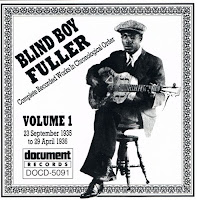Blind Boy Fuller (born Fulton Allen) (July 10, 1907 - February 13, 1941) was an American blues guitarist and vocalist. He was one of the most popular of the recorded Piedmont blues artists with rural Black Americans, a group that also included Blind Blake, Josh White, and Buddy Moss.
Vol. 1
"The finest collection ever of blues and ragtime. Fuller is here both solo and with Gary Davis, Sonny Terry, and Bull City Red. This is Piedmont blues at its best (1935-1936), a must for anyone interested in down-home blues."-- AMG review by Barry Lee Pearson
Vol. 2
"The second volume in Document's chronological overview of Blind Boy Fuller's life and music contains some of his most popular recordings, including the 1936 sessions which yielded both "Truckin' My Blues Away" (an update of Tampa Red's "What Is It That Tastes Like Gravy?") and "Mama Let Me Lay It on You" (a rendition of Memphis Minnie and Kansas Joe's "Can I Do It for You?"), both of them definitive versions. Fuller's gift for making familiar songs his own pops again on his next session, from early February of 1937; backed by Dipper Boy Council and Bull City Red, he delivers renditions of "Mamie," "Untrue Blues" (a version of the "Crow Jane" theme) and "New Oh Red!," all of them revelatory and unforgettable."
Vol. 3
"The 22 sides which comprise the third volume in Document's Blind Boy Fuller retrospective were all culled from sessions cut in the latter half of 1937; the first session, from mid-July, was recorded under the auspices of the Decca label, a situation which left Fuller's longtime manager J.B. Long -- as well as ARC Records -- none too happy. As a result, at the bluesman's next session, Long insisted he re-record many of the titles earlier cut for Decca, resulting in alternate takes of "Bulldog Blues," "Throw Your Yas Yas Back in Jail" (a.k.a. "Put You Back in Jail") and "Steel Hearted Woman" (a.k.a. "Why Don't My Baby Write to Me"); for blues historians, the chance to compare and contrast the sessions will be irresistible, although more casual fans might find this particular release less engaging than the others in the series."
Vol. 4
"Beginning with the mid-December, 1937 session which kicks off this fourth volume in Document's retrospective, Blind Boy Fuller entered into a recording partnership with the legendary harpist Sonny Terry that continued for the remainder of Fuller's studio career. Terry's blistering harmonica and falsetto interjections lent an exciting new dynamic to Fuller's sound, as classic sides like "Pistol Snapper Blues," "Mean and No Good Woman" and "Georgia Ham Mama" amply prove, each musician pushing the other to new creative heights."
Vol. 5
"Volume five in Document's Blind Boy Fuller series is comprised primarily of two prolific sessions, the first recorded in Columbia, South Carolina on October 29, 1938 with harpist Sonny Terry and washboard player Bull City Red, the second a Memphis date from July 12, 1939 with Terry, Bull City Red (now going as Oh Red) and second guitarist Sonny Jones. The latter is perhaps the most impressive, yielding the signature song "I Want Some of Your Pie" as well as "You've Got Something There" (a rewrite of Buddy Moss' "Daddy Don't Care") and Fuller's immortal rendition of J.B. Long's "Step It Up and Go.""
Vol. 6
"The sixth and final volume in the series assembles the fruits of Blind Boy Fuller's final studio sessions, all dating to the first half of 1940. Despite failing health, Fuller is at his most incendiary on these sides -- "Shake It, Baby" is among his most galvanizing dance tunes, while "Little Woman You're So Sweet" stands as one of his finest originals. Most energetic, however, are the sanctified songs, including "No Stranger Now," "Jesus Is a Holy Man" and "Twelve Gates to the City" -- with his death less than a year away, Fuller burns with spiritual intensity, clearly yearning for some kind of redemption in his final months."

